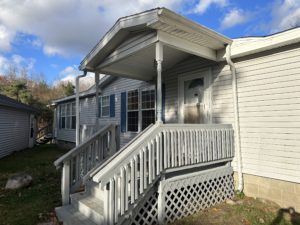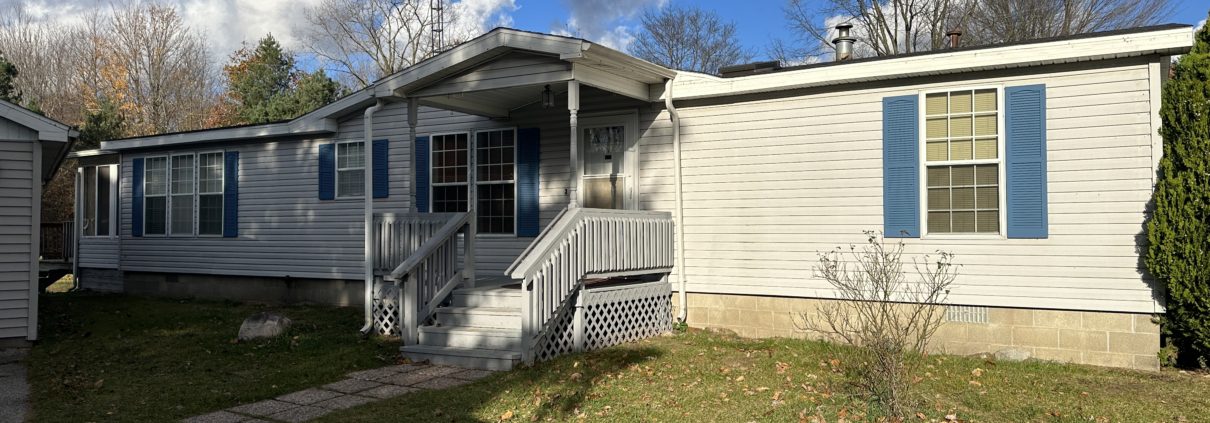Everything the home buyer needs to know about manufactured home foundation certifications
 Call it what you will, manufactured home certifications, HUD certifications, foundation certifications. The truth is, no one seems to agree on what to call them.
Call it what you will, manufactured home certifications, HUD certifications, foundation certifications. The truth is, no one seems to agree on what to call them.
You’re buying a manufactured home and your lender is suddenly asking for foundation certifications.
Why? Because, the bank requested appraiser, went to the home to complete an appraisal. In the process, the appraiser snapped some great pictures of each side of the home and filled out a report, to which your loan processor received. Boom! The loan processor looked at the appraisal and off we all go…
Loan processors ask their loan officers to ask their buyer/client to get a “something, something certificate”. At least that’s kinda how I get asked if I do them?!
It’s always a round about conversation where I get asked if I do a thing, and after a few well placed questions, I can determine the very thing they are asking me to do.
So, call it what you may, manufactured home certifications, HUD certifications, foundation certifications are required by a lender on government backed/insured loans when securing a mortgage for a manufactured home.
Why? Manufactured homes are not built to our local building code standards. Manufactured homes are built to HUD (United States Department of Housing and Urban Development) standards. HUD is the governing authority. HUD has an interest in making sure that after the manufactured home has left the manufacturer and been placed on its initial foundation, that nothing has changed to effect the structural integrity of the home.
Manufactured homes are not made to the same structural standards as traditionally built homes – and therefore HUD never relinquishes oversight. And, for good reason. Ultimately, it’s to keep its occupants safe!
Here lies the challenge. A manufactured home once setup and over a span of time is subjected to the same desires to add-to, and change the home as any other home. And by well meaning, but uneducated professional contractors and home owners.
In simple terms – HUD says that nothing, that’s ABSOLUTELY NOTHING, can be attached to the manufactured home that makes the attachment reliant on the home for support.
Think about it this way. That simple step at the front or back door; If I put the home on wheels and pulled it away from the steps, would the steps stay put, or collapse? What about the deck? The additional room? The list goes on. If anything relies on the home for support, HUD has an issue with it.
“Yeah, but Ian, my local building inspector said, it was fine! It’s been like that for years.”
Here’s an idea, HUD doesn’t care! HUD is the governing authority. Your local building official cares about local building codes and not the study of HUD building codes. It’s no ones fault. Your local building official isn’t the authority on this.
The lender, after reading from the HUD handbook is going to request that a structural engineer needs to approve/certify the home.
Here’s what really happens. Yes, you can pay for a structural engineer to leave their office and come inspect the home, but structural engineers don’t come cheap. Mostly, a qualified inspector like me (a Certified Master Inspector) does the actual HUD inspection and captures all the information and evidence that a structural engineer needs to make a decision to approve or deny certification.
 When working with someone with experience (like me), I have a good understanding of what will pass and what will fail HUD’s standards and will be able to walk you through the solutions so that you can get your closing process back on track.
When working with someone with experience (like me), I have a good understanding of what will pass and what will fail HUD’s standards and will be able to walk you through the solutions so that you can get your closing process back on track.
Your lender may ask for one or more different HUD certifications. Each certification has a cost and a purpose. It’s always easier and potentially less expensive if you the buyer asks for everything you need at the same time so that they can be inspected and processed by the engineer as a single file versus multiple files and inspections.
Here’s the standard certifications:
Permanent Foundation Certification:
The inspector and engineer evaluate the foundation and the methods that the manufactured home has been attached to the ground in compliance with HUD rules.
From an inspectors point of view – you need to know that your manufactured home is as safe as it can be. That the home is structurally and correctly tied to the ground that it is placed on.
Additions and Modifications Certification:
The inspector and engineer evaluate any and all additions and modifications to the manufactured home for compliance with HUD rules.
At the end of the day, while this all seems like a major nuisance, it’s an expense you typically didn’t expect, and it can potentially derail your closing schedule. Stressful times!! But HUD rules are there to help protect your safety.
A great inspector (like me – there are others) will get your Permanent Foundation Certifications, Additions and Modifications Certifications, HUD foundation certifications or plain old manufactured home certifications on track. Contact Smart Choice Inspection Company for more information.
If you have questions from anywhere, I’m happy to help. Good luck everyone!







